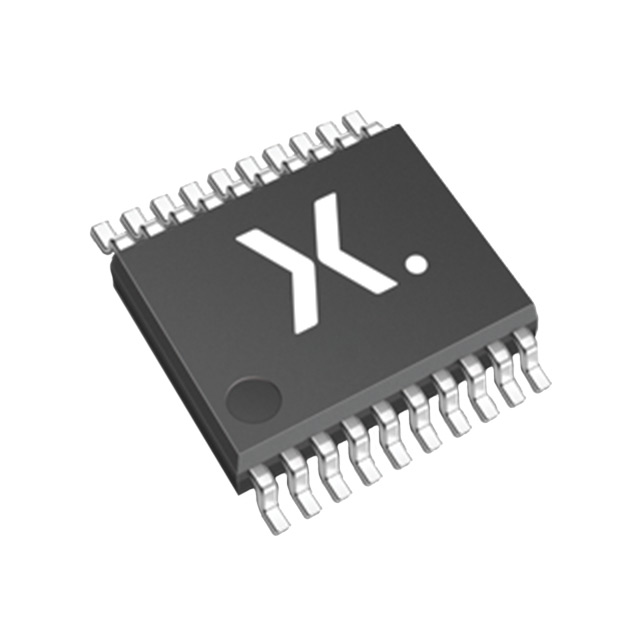Lihat spesifikasi untuk detail produk.

74LVT245PW,112
Basic Information Overview
- Category: Integrated Circuit (IC)
- Use: Level Shifter/Transceiver
- Characteristics: Low Voltage, Bi-directional, Tri-state
- Package: TSSOP (Thin Shrink Small Outline Package)
- Essence: Logic Level Translator
- Packaging/Quantity: Tape and Reel, 2500 pieces per reel
Specifications
- Supply Voltage Range: 1.2V to 3.6V
- Input Voltage Range: 0V to VCC
- Output Voltage Range: 0V to VCC
- Maximum Operating Frequency: 200MHz
- Number of Channels: 8
- Input/Output Type: CMOS/TTL Compatible
Detailed Pin Configuration
The 74LVT245PW,112 has a total of 20 pins. The pin configuration is as follows:
Pin 1: OE (Output Enable) - Active Low
Pin 2: A1 (Input/Output)
Pin 3: B1 (Input/Output)
Pin 4: GND (Ground)
Pin 5: B2 (Input/Output)
Pin 6: A2 (Input/Output)
Pin 7: VCC (Supply Voltage)
Pin 8: DIR (Direction Control)
Pin 9: A3 (Input/Output)
Pin 10: B3 (Input/Output)
Pin 11: A4 (Input/Output)
Pin 12: B4 (Input/Output)
Pin 13: A5 (Input/Output)
Pin 14: B5 (Input/Output)
Pin 15: A6 (Input/Output)
Pin 16: B6 (Input/Output)
Pin 17: A7 (Input/Output)
Pin 18: B7 (Input/Output)
Pin 19: A8 (Input/Output)
Pin 20: B8 (Input/Output)
Functional Features
- Bi-directional level shifting between two voltage domains.
- Tri-state outputs for bus sharing and isolation.
- CMOS/TTL compatible inputs and outputs.
- Low power consumption.
- High-speed operation.
Advantages and Disadvantages
Advantages: - Wide supply voltage range allows compatibility with various systems. - Bi-directional functionality simplifies bidirectional communication. - Tri-state outputs enable bus sharing and isolation. - CMOS/TTL compatibility ensures easy integration into existing designs. - Low power consumption helps in energy-efficient applications. - High-speed operation facilitates fast data transfer.
Disadvantages: - Limited number of channels (8) may not be sufficient for complex systems requiring more connections. - TSSOP package may require careful handling during assembly due to its small size.
Working Principles
The 74LVT245PW,112 is a logic level translator that allows bidirectional voltage translation between two voltage domains. It operates by receiving input signals from one domain and translating them to the appropriate voltage levels for the other domain. The direction of translation is controlled by the DIR pin. When the DIR pin is high, the translation is from A-side to B-side, and when it is low, the translation is from B-side to A-side. The OE pin enables or disables the outputs, allowing tri-state functionality for bus sharing and isolation.
Detailed Application Field Plans
The 74LVT245PW,112 is commonly used in various applications where voltage translation is required. Some of the typical application fields include: - Communication systems - Data acquisition systems - Industrial automation - Automotive electronics - Consumer electronics
Detailed and Complete Alternative Models
- SN74LVC245APW,112
- MC74LVC245ADWR2G
- CD74HCT245M96
- 74AHC245PW,118
These alternative models offer similar functionality and can be used as replacements for the 74LVT245PW,112 in various applications.
Word count: 399 words
Sebutkan 10 pertanyaan dan jawaban umum terkait penerapan 74LVT245PW,112 dalam solusi teknis
Sure! Here are 10 common questions and answers related to the application of 74LVT245PW,112 in technical solutions:
Q: What is the function of the 74LVT245PW,112? A: The 74LVT245PW,112 is an octal bus transceiver with 3-state outputs. It allows bidirectional transfer of data between different voltage levels.
Q: What is the operating voltage range for the 74LVT245PW,112? A: The 74LVT245PW,112 operates within a voltage range of 1.65V to 3.6V.
Q: How many data lines can the 74LVT245PW,112 handle? A: The 74LVT245PW,112 can handle 8 data lines in both directions.
Q: Can the 74LVT245PW,112 be used for level shifting between different voltage domains? A: Yes, the 74LVT245PW,112 is commonly used for level shifting between different voltage domains due to its bidirectional capability.
Q: What is the maximum data transfer rate supported by the 74LVT245PW,112? A: The 74LVT245PW,112 supports a maximum data transfer rate of 400 Mbps.
Q: Does the 74LVT245PW,112 have built-in protection features? A: Yes, the 74LVT245PW,112 has built-in ESD protection on all inputs and outputs.
Q: Can the 74LVT245PW,112 be used in both parallel and serial communication systems? A: Yes, the 74LVT245PW,112 can be used in both parallel and serial communication systems, depending on the application requirements.
Q: What is the power supply voltage required for the 74LVT245PW,112? A: The 74LVT245PW,112 requires a single power supply voltage of 1.65V to 3.6V.
Q: Can the 74LVT245PW,112 be used in high-speed applications? A: Yes, the 74LVT245PW,112 is designed for high-speed operation and can be used in various high-speed applications.
Q: Are there any specific layout considerations when using the 74LVT245PW,112? A: Yes, it is recommended to follow the manufacturer's guidelines for proper PCB layout, including minimizing trace lengths and providing adequate decoupling capacitors near the device.
Please note that these answers are general and may vary based on specific application requirements and datasheet specifications.

